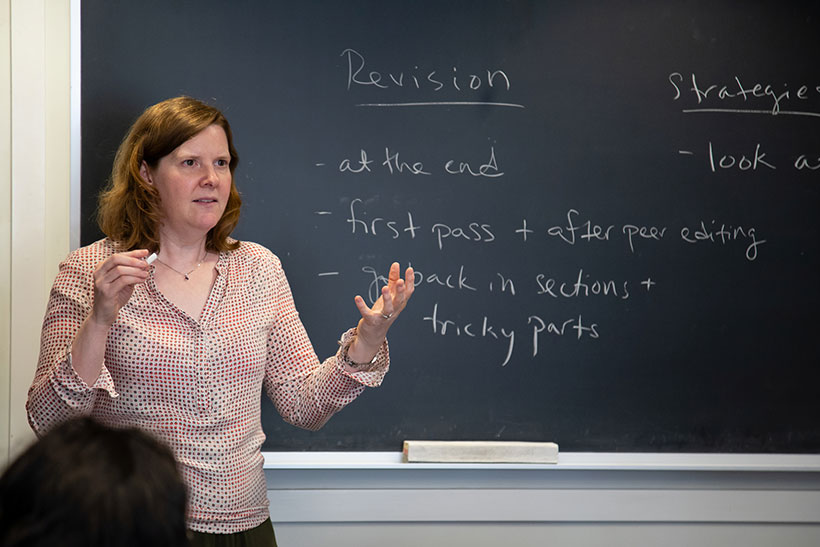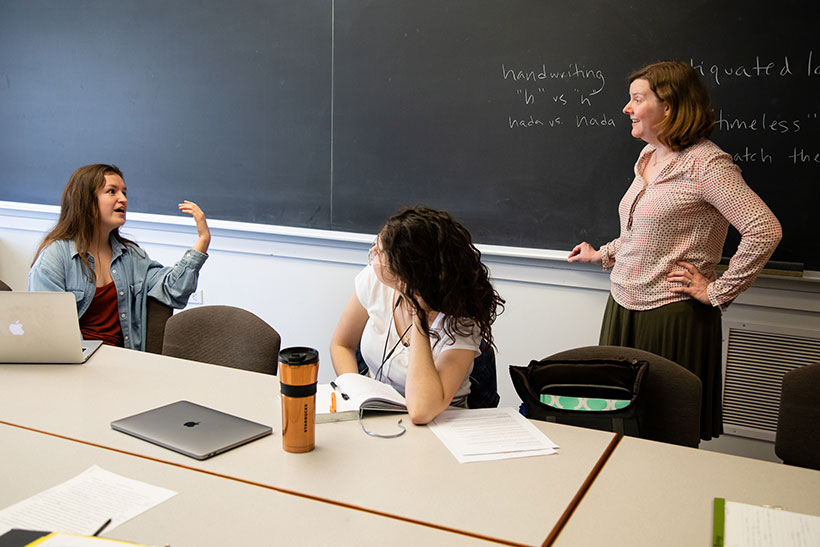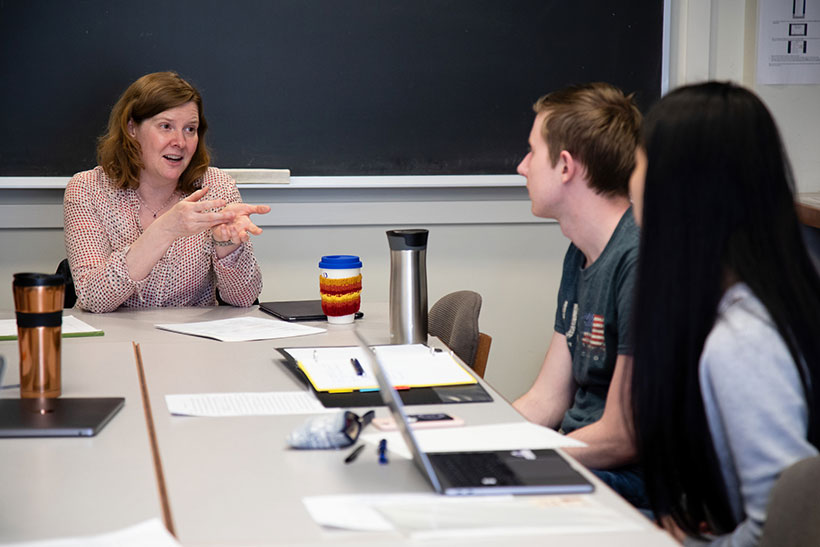
Sara Brenneis, associate professor of Spanish speaking to students enrolled in her “War in Translation” seminar.
“Translation is the other side of a tapestry,” Miguel de Cervantes is thought to have said: it has a hidden, imperfect beauty. This spring semester, four bilingual students followed the thread in a new special seminar called “War in Translation.”
Each student tilted at vital, as-yet-untranslated, non-English primary source materials from a different conflict in the 20th century. Working closely with Sara Brenneis, associate professor of Spanish, plus their classmates and Frost Library staff, they identified and decoded hundreds of letters, diary entries, newspaper articles and more.
Two students labored over Spanish-language texts, while one translated from Mandarin and another from Russian. The focus wasn’t on debating word choices with each other (though that did indeed happen), as much as on creating an intellectual support team as they worked—with a professor who was also enmeshed in her own translation project.

From left to right: Amy Pass’20, Gabriela Bucio ’21, Professor Sara Brenneis
“They really did this from the ground up,” says Brenneis. “It was lots of hands-on archival work for them. They had to be essentially bilingual so I could trust that their language skills were up to it. Each week, we worked on the nuts and bolts of the research process and translation process, with much troubleshooting along the way.”
I sat in on a class in April, in Chapin Hall, with a view of neon orange traffic cones and neon yellow forsythia out the window. During one half of class, each student laid out their latest thorny problems, while Brenneis and the others suggested fixes. In the other half, the students broke into pairs and exchanged laptops to read one another’s latest translations, then offer critiques.

Amy Pass ’20 working with Professor Sara Brenneis
Things kick off with Amy Pass ’20, who says she’s struggling with chronological challenges. Pass is translating the prison diary entries of José Revueltas, a leftist activist during the Mexican Dirty War of the 1960s and 1970s, here writing about everything from current politics, to his own sense of despair, to planning a prison garden. Revueltas helped inspire the student movement which culminated in the 1968 Tlatelolco massacre in Mexico City. Pass has family in Mexico, and has visited the city’s monument to the tragic event.
“Most of these musings are not dated, and they appear out of order in the scanned copies,” says Pass in class, adding that she’s tried cross-checking Revueltas’ words against news articles from the time. “But it’s still a lot of guessing.”
Brenneis writes on the board: “Order, Undated Sources.” She asks if others are having similar issues, and Gabriela Bucio ’21 nods yes. She also has family in Mexico (in the state of Colima) and is translating material by soldaderas, female combatants from the Mexican Revolution of 1910–1920. Bucio vents about the fact that the spouse of one of her sources uses dates that are tagged to the time of a later transcription, rather than the date of origin.
“How do you decide between chronological order or a more cognitive order?” asks Brenneis, tying the discussion to how the students might arrange their texts by theme or time frame for their final projects. “That’s a fancy way of saying, ‘What kind of flow makes sense to you as an editor and translator? You may not be able to pinpoint the chronology of your text. But you have to be transparent and say, ‘Original date not known.’”

From left to right: Professor Sara Brenneis, Konstantin Larin ’21, and Lianbi Ji ’21
Lianbi Ji ’21 says she’s frustrated by the difficulty of finding sources she can trust for her project on the economic upheaval of China in the 1990s. “I picked this time of massive layoffs to dig into more personal narratives, and to understand my country better,” explains Ji, who is from the city of Suzhou.
She has stumbled across a link to a relevant book by a film director—but could only find the version censored by the Chinese government, not the real thing.
“This is the non-propaganda source you’ve been hoping to find,” says Brenneis sympathetically, and writes on the blackboard “Source Provenance.” A conversation follows about copyright, the dark web and ways to distinguish between a bona fide and sketchy source.

From left to right: Lianbi Ji ’21, Gabriela Bucio ’21, Konstantin Larin ’21, and Amy Pass ’20
Later, as the students split into pairs, Bucio reads a passage translated by Konstantin Larin ’21. Larin, who is from the Russian city of Volgograd, is diving into the World War I-era articles of the Russian socialist Nikolai Avksentiev, which are housed in the Amherst Center for Russian Culture. One sticking point is that Avksentiev uses quotation marks enigmatically.
“From the English-language perspective, it reads as sarcastic, and I’m not sure that’s what he meant in tone,” says Brenneis. Bucio suggests Larin could drop the quote marks and sub in the word “so-called,” though admits this device could get stale.
After class, Ji reflects on the seminar’s impact: “Professor Brenneis creates different ways in which we can work as a group and feel ownership of the projects and solve problems together. It’s comforting to complete the work this way.”
Three of the four classmates will continue their research on campus this summer.